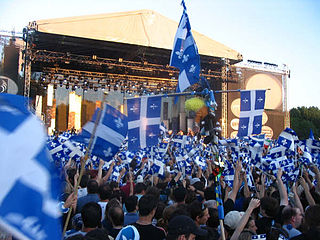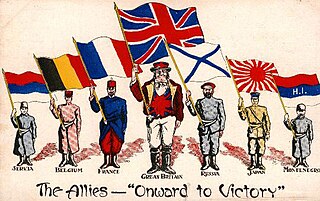Related Research Articles

Irredentism is one state's desire to annex the territory of another state. This desire can be motivated by ethnic reasons because the population of the territory is ethnically similar or the same to the population of the parent state. Historical reasons may also be responsible, i.e., that the territory previously formed part of the parent state. However, difficulties in applying the concept to concrete cases have given rise to academic debates about its precise definition. Disagreements concern whether either or both ethnic and historical reasons have to be present and whether non-state actors can also engage in irredentism. A further dispute is whether attempts to absorb a full neighboring state are also included. There are various types of irredentism. For typical forms of irredentism, the parent state already exists before the territorial conflict with a neighboring state arises. However, there are also forms of irredentism in which the parent state is newly created by uniting an ethnic group spread across several countries. Another distinction concerns whether the country to which the disputed territory currently belongs is a regular state, a former colony, or a collapsed state.

A nation-state is a political unit where the state and the nation are congruent. It is a more precise concept than "country", since a country does not need to have a predominant national or ethnic group.
Nationalism is an idea or movement that holds that the nation should be congruent with the state. As a movement, it presupposes the existence and tends to promote the interests of a particular nation, especially with the aim of gaining and maintaining its sovereignty (self-governance) over its perceived homeland to create a nation-state. It holds that each nation should govern itself, free from outside interference (self-determination), that a nation is a natural and ideal basis for a polity, and that the nation is the only rightful source of political power. It further aims to build and maintain a single national identity, based on a combination of shared social characteristics such as culture, ethnicity, geographic location, language, politics, religion, traditions and belief in a shared singular history, and to promote national unity or solidarity. There are various definitions of a "nation", which leads to different types of nationalism. The two main divergent forms are ethnic nationalism and civic nationalism.
A nation is a type of social organization where a collective identity, a national identity, has emerged from a combination of shared features across a given population, such as language, history, ethnicity, culture, territory or society. Some nations are constructed around ethnicity while others are bound by political constitutions.

Multiculturalism is the coexistence of multiple cultures. The word is used in sociology, in political philosophy, and colloquially. In sociology and everyday usage, it is usually a synonym for ethnic or cultural pluralism in which various ethnic and cultural groups exist in a single society. It can describe a mixed ethnic community area where multiple cultural traditions exist or a single country. Groups associated with an indigenous, aboriginal or autochthonous ethnic group and settler-descended ethnic groups are often the focus.

An ethnic conflict is a conflict between two or more ethnic groups. While the source of the conflict may be political, social, economic or religious, the individuals in conflict must expressly fight for their ethnic group's position within society. This criterion differentiates ethnic conflict from other forms of struggle.
An ethnicity or ethnic group is a group of people who identify with each other on the basis of perceived shared attributes that distinguish them from other groups. Those attributes can include a people of a common language, culture, common sets of ancestry, traditions, society, religion, history, or social treatment. The term ethnicity is sometimes used interchangeably with the term nation, particularly in cases of ethnic nationalism.

In religious studies, an ethnic religion or ethnoreligion is a religion or belief associated with notions of heredity and a particular ethnicity. Ethnic religions are often distinguished from universal religions, such as Christianity or Islam, which are not limited in ethnic, national or racial scope.

Quebec nationalism or Québécois nationalism is a feeling and a political doctrine that prioritizes cultural belonging to, the defense of the interests of, and the recognition of the political legitimacy of the Québécois nation. It has been a movement and a central issue in Quebec politics since the beginning of the 19th century. Québécois nationalism has seen several political, ideological and partisan variations and incarnations over the years.
The term "minority group" has different usages, depending on the context. According to its common usage, the term minority group can simply be understood in terms of demographic sizes within a population: i.e. a group in society with the least number of individuals, or less than half, is a "minority". Usually a minority group is disempowered relative to the majority, and that characteristic lends itself to different applications of the term minority.

William Kymlicka is a Canadian political philosopher best known for his work on multiculturalism and animal ethics. He is currently Professor of Philosophy and Canada Research Chair in Political Philosophy at Queen's University at Kingston, and Recurrent Visiting professor in the Nationalism Studies program at the Central European University in Budapest, Hungary. For over 20 years, he has lived a vegan lifestyle, and he is married to the Canadian author and animal rights activist Sue Donaldson.
An ethnocracy is a type of political structure in which the state apparatus is controlled by a dominant ethnic group to further that group's interests, power, dominance, and resources. Ethnocratic regimes in the modern era typically display a 'thin' democratic façade covering a more profound ethnic structure, in which ethnicity —and not citizenship—is the key to securing power and resources. An ethnocratic society facilitates the ethnicization of the state by the dominant group, through the expansion of control likely accompanied by conflict with minorities or neighbouring states.

National identity is a person's identity or sense of belonging to one or more states or one or more nations. It is the sense of "a nation as a cohesive whole, as represented by distinctive traditions, culture, and language".
A stateless nation is an ethnic group or nation that does not possess its own sovereign state. Use of the term implies that such ethnic groups has the right to self-determination, to establish an independent nation-state with its own government. Members of stateless nations may be citizens of the country in which they live, or they may be denied citizenship by that country. Stateless nations are usually not represented in international sports or in international organisations such as the United Nations. Nations without a state are classified as fourth-world nations. Some stateless nations have a history of statehood, while some were always stateless.
Civic nationalism, otherwise known as democratic nationalism, is a form of nationalism that adheres to traditional liberal values of freedom, tolerance, equality, and individual rights, and is not based on ethnocentrism. Civic nationalists often defend the value of national identity by saying that individuals need it as a partial shared aspect of their identity in order to lead meaningful, autonomous lives and that democratic polities need a national identity to function properly. Liberal nationalism is used in the same sense as 'civic nationalism', but liberal ethnic nationalism also exists, and "state nationalism" is a branch of civic nationalism, but it can also be illiberal.
The term ethnic democracy, as used by some political scientists, purports to describe a governance system that combines a structured ethnic dominance with democratic, political and civil rights for all. Both the dominant ethnic group—typically an ethnic majority—and the minority ethnic groups have citizenship and are able to fully participate in the political process. However, critics of the "ethnic democracy" model argue it is a contradiction in terms, and thus conceptually inadequate or confusing; these critics allege that purported ethnic democracies, most notably Israel, are not democratic at all, or are at best a sort of semi-democracy.
Cultural nationalism is a term used by scholars of nationalism to describe efforts among intellectuals to promote the formation of national communities through emphasis on a common culture. It is contrasted with "political" nationalism, which refers to specific movements for national self-determination through the establishment of a nation-state.
Among scholars of nationalism, a number of types of nationalism have been presented. Nationalism may manifest itself as part of official state ideology or as a popular non-state movement and may be expressed along Race, civic, ethnic, language, religious or ideological lines. These self-definitions of the nation are used to classify types of nationalism, but such categories are not mutually exclusive and many nationalist movements combine some or all of these elements to varying degrees. Nationalist movements can also be classified by other criteria, such as scale and location.
Territorial nationalism describes a form of nationalism based on the belief that all inhabitants of a particular territory should share a common national identity, regardless of their ethnic, linguistic, religious, cultural and other differences. Depending on the political or administrative status of a particular territory, territorial nationalism can be manifested on two basic levels, as territorial nationalism of distinctive sovereign states, or territorial nationalism of distinctive sub-sovereign regions.
Ethnic nationalism, also known as ethnonationalism, is a form of nationalism wherein the nation and nationality are defined in terms of ethnicity, with emphasis on an ethnocentric approach to various political issues related to national affirmation of a particular ethnic group.
References
- ↑ Williams, Paul (1999). The Northern Ireland Peace Agreement: Evolving the Principle of Self-Determination. American University Washington College of Law. p. 163.
- ↑ Kostov, Chris (2010). Contested Ethnic Identity: The Case of Macedonian Immigrants in Toronto, 1900-1996. Peter Lang. p. 16. ISBN 978-3-0343-0196-1.
- ↑ Jenkins, John; Pigram, John (2004-08-02). Encyclopedia of Leisure and Outdoor Recreation. Routledge. p. 158. ISBN 978-1-134-52840-0.
- ↑ Kymlicka, Will (2004). "Culturally Responsive Policies" (PDF). Human Development Report Office. p. 17.
{{cite web}}: CS1 maint: url-status (link)[ dead link ]